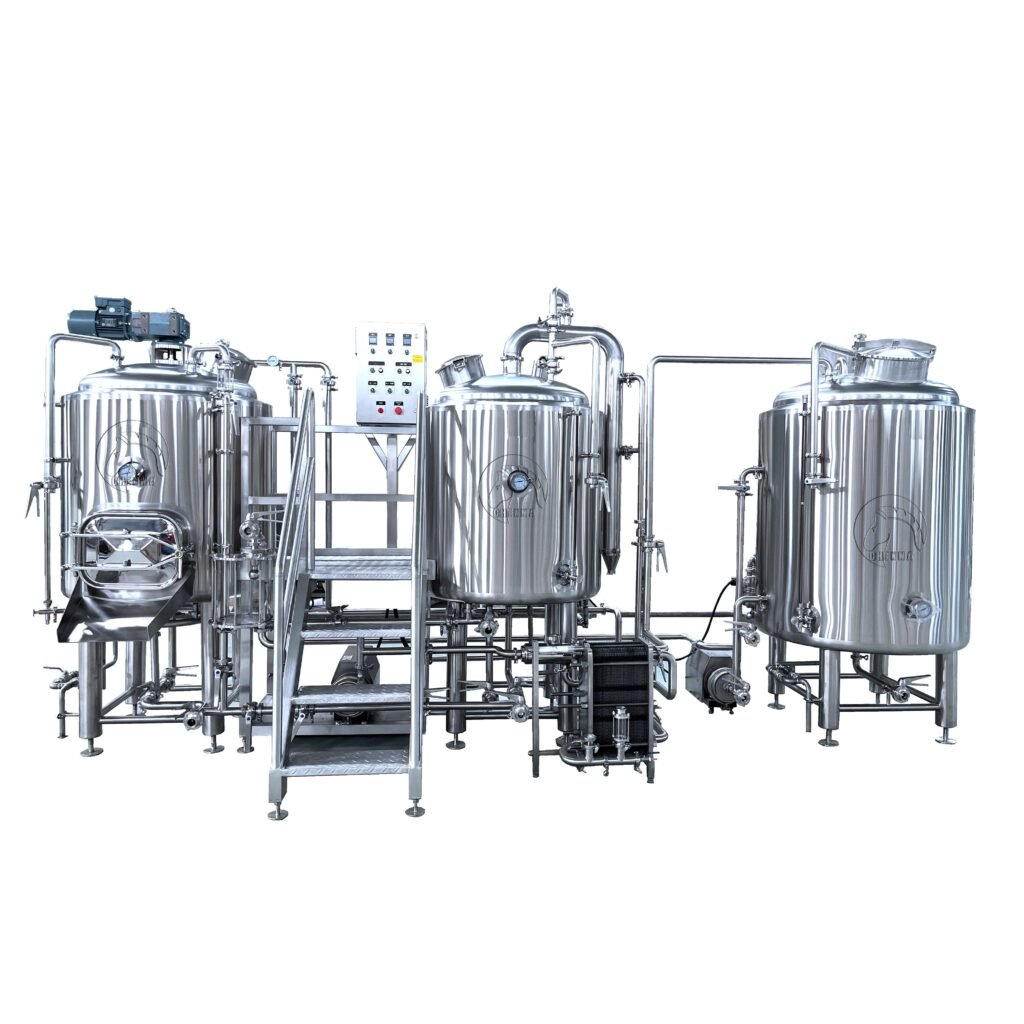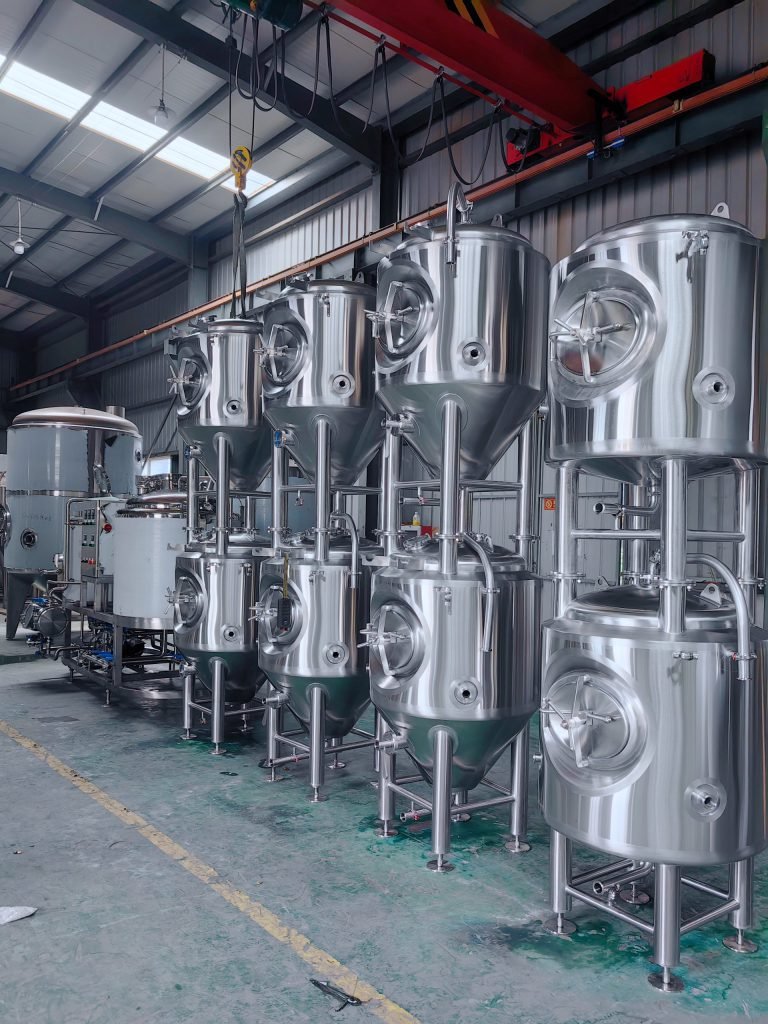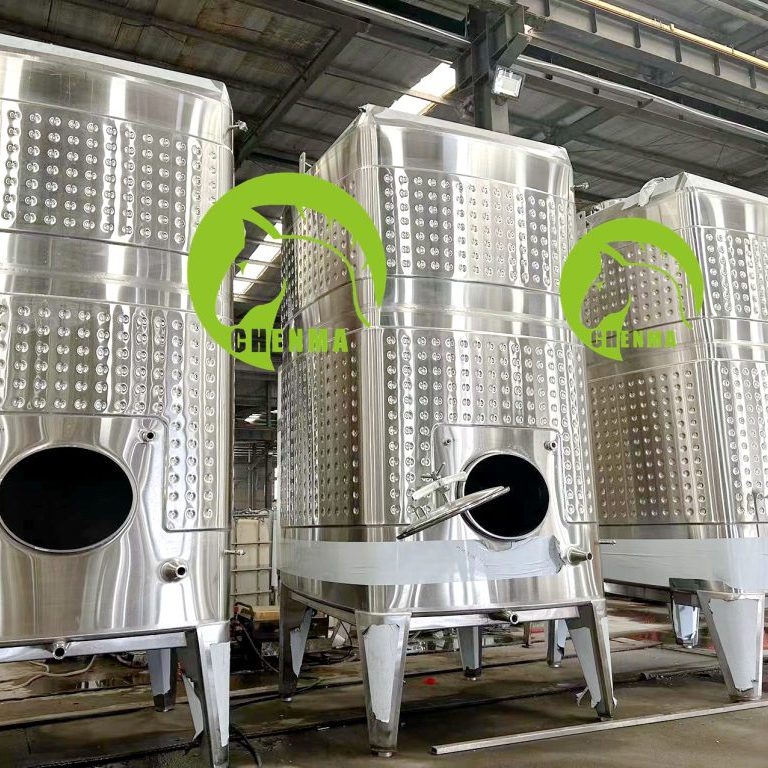
The brewery supply chain represents a complex network of suppliers, manufacturers, distributors, and retailers that
work together to bring beer from raw ingredients to consumers. Understanding this intricate system is essential for
brewery owners, operators, and industry professionals who need to optimize operations, manage costs, and ensure
consistent product quality. This comprehensive guide examines every aspect of the brewery supply chain, from raw
material sourcing through final distribution, providing insights into best practices, equipment requirements, and
strategic considerations for successful brewery operations.
Table of Contents
- Supply Chain Overview and Key Components
- Raw Materials Sourcing and Management
- Equipment Suppliers and Manufacturing Partners
- Production Process and Internal Operations
- Packaging Materials and Container Supply
- Distribution Networks and Logistics
- Quality Control Throughout the Supply Chain
- Supply Chain Optimization Strategies
Supply Chain Overview and Key Components
The brewery supply chain encompasses all activities from the initial sourcing of raw materials to the final
delivery of finished beer products to consumers. This complex network involves multiple stakeholders, each playing a
critical role in ensuring the quality, consistency, and availability of beer products in the marketplace.
Primary Supply Chain Stakeholders
The brewery supply chain typically includes several key stakeholders, each contributing essential elements to the
production process. Raw material suppliers provide the fundamental ingredients including malt,
hops, yeast, and water treatment chemicals. Equipment manufacturers supply the brewing systems,
fermentation tanks, and packaging machinery necessary for production. Packaging suppliers deliver
bottles, cans, kegs, and labeling materials, while distributors and retailers handle the final
stages of product delivery to consumers.
| Supply Chain Stage | Key Suppliers | Primary Products/Services | Critical Success Factors |
|---|---|---|---|
| Raw Materials | Malt houses, hop farms, yeast laboratories | Malt, hops, yeast, water treatment | Quality consistency, timely delivery |
| Equipment | Brewing equipment manufacturers | Tanks, pumps, heat exchangers | Reliability, technical support |
| Packaging | Glass/can manufacturers, label printers | Bottles, cans, labels, caps | Cost efficiency, sustainability |
| Distribution | Wholesalers, retailers, logistics companies | Storage, transportation, sales | Market reach, cold chain maintenance |
Supply Chain Flow and Dependencies
The brewery supply chain operates as an interconnected system where disruptions in one area can significantly
impact overall operations. Raw material availability directly affects production scheduling, while equipment
reliability influences output capacity and product quality. Understanding these dependencies is crucial for
developing effective supply chain management strategies that minimize risks and optimize performance.
Raw Materials Sourcing and Management
Raw materials form the foundation of the brewery supply chain, directly influencing product quality, flavor
profiles, and production costs. Effective sourcing and management of these materials requires careful supplier
selection, quality assurance protocols, and inventory management strategies.
Primary Brewing Ingredients
Malt represents the largest ingredient component by volume in most beer recipes, typically sourced
from specialized malt houses that process barley and other grains. Quality malt suppliers provide detailed
specifications including extract potential, color contributions, and enzymatic activity levels.
Hops sourcing involves working with hop farms and brokers who can provide specific varieties with
desired alpha acid levels and aromatic characteristics. Yeast procurement typically involves
partnerships with specialized laboratories that maintain pure cultures and provide technical support for
fermentation management.
Water Treatment and Utilities
Water quality represents a critical factor in beer production, often requiring specialized treatment chemicals and
equipment. Suppliers of water treatment solutions provide chemicals for pH adjustment, mineral content modification,
and chlorine removal. Understanding local water profiles and working with qualified suppliers ensures consistent
brewing water quality across all production batches.
Inventory Management Strategies
Effective raw material inventory management balances the need for consistent supply availability with the costs
associated with carrying excess stock. Just-in-time procurement strategies can reduce carrying
costs but require reliable suppliers and accurate demand forecasting. Safety stock maintenance
provides protection against supply disruptions but increases storage costs and potential waste from ingredient
degradation.
Equipment Suppliers and Manufacturing Partners
Brewing equipment suppliers form a critical component of the brewery supply chain, providing the technology and
machinery necessary for efficient beer production. The relationship with equipment manufacturers extends beyond
initial purchase to include ongoing maintenance, upgrades, and technical support.
Primary Equipment Categories
Brewery equipment suppliers typically specialize in specific categories of equipment, each requiring different
technical expertise and support capabilities. Fermentation systems represent one of the most
critical equipment categories, requiring suppliers with deep understanding of fermentation processes and fermentation tank design principles.
Professional equipment manufacturers like Shandong Chenma Machinery
Co., Ltd. specialize in providing comprehensive brewing solutions from small craft systems to large-scale
commercial installations. Located in Shandong Province, Chenma operates a 20,000 m² production facility with over
200 professionals focused on manufacturing stainless steel tanks and processing equipment for the beverage industry.
Equipment Selection Criteria
Selecting appropriate equipment suppliers requires evaluation of multiple factors including technical capabilities,
quality standards, service support, and long-term viability. Suppliers should demonstrate compliance with relevant
certifications such as ISO9001 quality management systems, FDA food safety
standards, and industry-specific requirements for brewing equipment.
| Equipment Type | Key Specifications | Supplier Considerations | Typical Capacity Range |
|---|---|---|---|
| Fermentation Tanks | SS304 construction, cooling systems | Technical support, customization | 1BBL – 500BBL |
| Brewhouses | Heat exchangers, automation | Integration capabilities | 3BBL – 100BBL |
| Packaging Lines | Speed, flexibility, sanitation | Training, maintenance support | 500-10,000 containers/hour |
| Quality Control | Accuracy, reliability | Calibration services | Various testing parameters |
Production Process and Internal Operations

The internal production process represents the core transformation phase of the brewery supply chain, where raw
materials are converted into finished beer products. This stage requires careful coordination of equipment,
personnel, and processes to ensure consistent quality and efficient throughput.
Brewing Operations Management
Effective brewing operations management involves coordinating multiple concurrent processes including mashing,
lautering, boiling, fermentation, and conditioning. Each stage requires specific equipment, precise timing, and
quality monitoring to achieve desired product characteristics. Fermentation management represents
one of the most critical aspects, requiring proper temperature control, yeast health monitoring, and contamination
prevention.
Modern breweries utilize sophisticated fermentation
tanks equipped with advanced temperature control systems, CIP (Clean-in-Place) capabilities, and integrated
monitoring systems. These vessels typically feature SS304 stainless steel construction with dimple cooling jackets,
ensuring optimal fermentation conditions while maintaining sanitary standards.
Production Scheduling and Capacity Planning
Production scheduling in breweries requires careful coordination of fermentation tank availability, raw material
supply, and packaging resources. Capacity constraints often center around fermentation tank
availability, making proper sizing and scheduling critical for meeting production targets. Many breweries benefit
from variable capacity tanks that provide
flexibility in batch sizing and improve overall facility utilization.
Quality Assurance Integration
Quality assurance activities must be integrated throughout the production process to ensure product consistency and
safety. This includes raw material testing, in-process monitoring during fermentation, and finished product
analysis. Proper documentation and traceability systems enable rapid response to quality issues and support
continuous improvement initiatives.
Packaging Materials and Container Supply

Packaging materials supply represents a significant component of brewery operations, affecting both product
protection and brand presentation. The packaging supply chain requires careful coordination with production
schedules while managing inventory levels and ensuring material quality.
Container Options and Suppliers
Glass bottles remain popular for craft breweries seeking premium presentation, typically sourced
from specialized glass manufacturers who can provide various sizes, colors, and shapes. Aluminum
cans offer advantages in portability, light protection, and recyclability, though they require
relationships with can manufacturers and potential minimum order considerations.
Kegs represent an important packaging option for draft beer distribution, requiring suppliers who
can provide various sizes and connection types. Stainless steel kegs offer durability and easy sanitization, making
them ideal for breweries serving the restaurant and bar market segments.
Labeling and Branding Materials
Label suppliers provide critical branding elements that differentiate products in the marketplace. Modern label
suppliers offer various materials, printing techniques, and application methods to meet specific brewery
requirements. Digital printing capabilities enable smaller lot sizes and seasonal product
variations, while pressure-sensitive labels facilitate automated application processes.
Packaging Equipment Integration
Packaging equipment suppliers must coordinate with container and label suppliers to ensure compatibility and
efficient operation. Bottling lines require precise integration between rinsing, filling, capping,
and labeling equipment. Canning systems demand even tighter tolerances and coordination between
filling, seaming, and coding operations.
Distribution Networks and Logistics
Distribution networks form the final link in the brewery supply chain, connecting finished products with consumers
through various channels. The complexity of distribution systems varies significantly based on market reach, product
types, and regulatory requirements.
Distribution Channel Options
Self-distribution provides maximum control over product handling and customer relationships but
requires significant investment in vehicles, personnel, and regulatory compliance. Wholesale
distribution offers broader market reach and established customer relationships but reduces profit
margins and limits direct customer contact.
Retail partnerships enable product placement in grocery stores, convenience stores, and specialty
beer retailers. These relationships require consideration of product positioning, promotional support, and inventory
management to ensure adequate product availability and rotation.
Cold Chain Management
Beer quality maintenance throughout distribution requires careful temperature control, particularly for
unpasteurized craft beers. Cold storage facilities at distribution centers help maintain product
freshness, while refrigerated transportation protects quality during transit. Monitoring systems
can track temperature exposure and identify potential quality issues before products reach consumers.
Inventory Management in Distribution
Distribution inventory management balances product availability with the costs of carrying stock and potential
waste from expired products. First-in, first-out (FIFO) systems ensure proper product rotation,
while demand forecasting helps optimize inventory levels across distribution points.
Quality Control Throughout the Supply Chain
Quality control systems must be implemented at every stage of the brewery supply chain to ensure product
consistency, safety, and regulatory compliance. These systems require coordination between suppliers, internal
operations, and distribution partners to maintain standards from raw materials to final consumption.
Supplier Quality Management
Supplier certification programs establish quality standards and verification procedures for all
supply chain partners. Raw material suppliers should provide certificates of analysis for each delivery, while
equipment suppliers should demonstrate compliance with relevant industry standards and certifications.
Leading equipment manufacturers like Chenma Machinery maintain
comprehensive quality certifications including ISO9001-2005 quality system certification,
ISO14001-2015 environmental management system certification, and EU CE
certification, ensuring their products meet international quality standards.
In-Process Quality Monitoring
Production quality monitoring requires regular testing and documentation at critical control points throughout the
brewing process. Raw material testing verifies ingredient specifications, while
fermentation monitoring tracks key parameters such as temperature, pH, and gravity to ensure proper
progression.
Finished Product Testing
Comprehensive finished product testing ensures that all products meet specifications before release to distribution
channels. Testing protocols typically include microbiological analysis, chemical composition verification, and
sensory evaluation to confirm product quality and consistency.
Supply Chain Optimization Strategies
Supply chain optimization in breweries requires continuous evaluation and improvement of all supply chain
components to enhance efficiency, reduce costs, and improve product quality. These strategies must balance competing
objectives while maintaining flexibility to respond to market changes and growth opportunities.
Supplier Relationship Management
Strategic partnerships with key suppliers can provide advantages including preferential pricing,
priority allocation during shortages, and collaborative product development. Supplier
diversification reduces risks associated with single-source dependencies while potentially improving
negotiating leverage.
Long-term relationships with equipment suppliers enable better planning for capacity expansions and technology
upgrades. Manufacturers offering comprehensive support services, such as those provided by stainless steel tank
manufacturers, can provide valuable technical expertise and rapid response to operational challenges.
Technology Integration
Enterprise resource planning (ERP) systems enable integration of supply chain activities including
procurement, inventory management, production scheduling, and distribution planning. Automated monitoring
systems provide real-time visibility into production processes and can alert operators to potential
issues before they impact product quality.
Sustainability Initiatives
Sustainable supply chain practices increasingly influence supplier selection and operational decisions.
Local sourcing can reduce transportation costs and environmental impact while supporting regional
economies. Packaging optimization focuses on reducing material usage while maintaining product
protection and brand presentation.
Scalability Planning
Supply chain strategies must accommodate growth plans and market expansion opportunities. Modular equipment
designs enable incremental capacity increases without major facility modifications. Flexible
supplier agreements provide the ability to scale volumes up or down based on market demands.
| Optimization Area | Key Strategies | Expected Benefits | Implementation Challenges |
|---|---|---|---|
| Supplier Management | Strategic partnerships, diversification | Cost reduction, risk mitigation | Relationship development time |
| Inventory Optimization | Demand forecasting, JIT delivery | Reduced carrying costs | Forecast accuracy requirements |
| Quality Systems | Automated monitoring, certification | Consistency, compliance | Initial investment costs |
| Technology Integration | ERP systems, automation | Visibility, efficiency | Staff training, system complexity |
For breweries seeking to optimize their supply chain operations, working with experienced partners who understand
the unique requirements of beverage production is essential. Contact Shandong Chenma Machinery Co., Ltd. for expert consultation on brewing equipment
solutions and supply chain optimization strategies. Reach out via WhatsApp at 008618063421809 or
email admin@sdchenma.com to discuss your specific brewery
supply chain needs.
Located in Pingyuan County Economic Development Zone, Dezhou City, Shandong Province, Chenma provides comprehensive turnkey solutions including process
design, equipment manufacturing, installation and commissioning, and technical training. Their expertise in mixing tank systems and fermentation equipment makes them
an ideal partner for breweries seeking to establish or optimize their supply chain operations.
The brewery supply chain represents a complex but manageable system that requires careful planning, supplier
relationship management, and continuous optimization. By understanding each component of the supply chain and
implementing appropriate strategies for supplier selection, quality management, and operational efficiency,
breweries can build resilient systems that support sustainable growth while maintaining product quality and customer
satisfaction. Success in managing the brewery supply chain ultimately depends on developing strong partnerships with
suppliers, investing in appropriate technology and equipment, and maintaining flexibility to adapt to changing
market conditions and opportunities.



